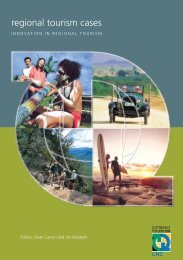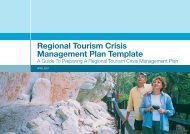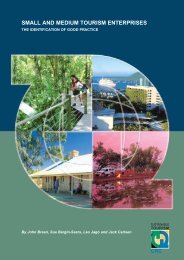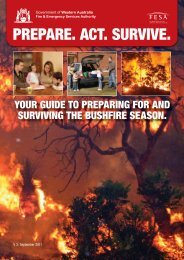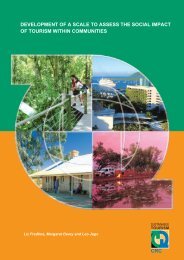Tourism Risk Management - Sustainable Tourism Online
Tourism Risk Management - Sustainable Tourism Online
Tourism Risk Management - Sustainable Tourism Online
Create successful ePaper yourself
Turn your PDF publications into a flip-book with our unique Google optimized e-Paper software.
annually as a minimum, and then review and amend your plans and training programs subsequent to<br />
each exercise and after any activation of the plans.<br />
• Designate spokespersons<br />
It is essential that information to the media be coordinated and provided by an authoritative source.<br />
The designated spokesperson should be a senior, suitably trained, and credible destination<br />
representative. Additional trained spokespersons must also be designated as a crisis may extend<br />
over many days. Personnel should undergo specific media training including regular practice in mock<br />
news conferences and rehearsals.<br />
• Establish a press and communications unit<br />
Every tourism destination should have a communications unit. This unit would normally be located<br />
within the regional or local tourism organization office and should include staff trained in working with<br />
the media, a contact list of local and international media, several telephone lines, fax broadcast<br />
machines, a mass email computer program, and background information on the destination -<br />
including maps, stock photos, arrivals statistics and fact sheets on previous crises. If possible, this<br />
background information should be available in a special media section of the destination’s website.<br />
• Communicate regularly with media<br />
Relationships can take years to develop, so it is important to communicate regularly with the media,<br />
in good times as well as bad. The policy should be one of honesty and transparency. You can<br />
establish your credibility and an effective working relationship with the media by supplying them with<br />
information about what is new in your destination; by responding promptly to questions they have,<br />
and by providing the opportunity for familiarization visits for journalists.<br />
• Pay attention to local media<br />
Local newspapers, television and radio are a primary source of information for the international<br />
media. In a crisis, local news reports can go global within minutes. So even though your principal<br />
target is media in the main generating markets, you cannot afford to ignore local journalists. They will<br />
also continue to report the crisis recovery story long after the international media has departed.<br />
• Train spokespersons in safety and security issues<br />
Communication on security matters should be in response to a relevant crisis situation, rather than<br />
proactive. When a crisis erupts, the spokesperson should be able to communicate in an authoritative<br />
manner, but striking a balance between providing sufficient information and providing unnecessary<br />
detail and emphasis on security issues. According to one tourism minister experienced in such<br />
matters: “You do security, you don’t talk about it”.<br />
B) Promotion planning<br />
• Develop a database of partners in the travel trade<br />
A database should be maintained of all tour operators sending visitors to your destination, major<br />
travel agencies and transport companies in your key generating markets, incoming operators and<br />
tour organizers, as well as local hotels, transport companies, local promotion boards and tourism<br />
associations.<br />
• Build an email or fax broadcast system<br />
Communication systems capable of reaching the partners in your database should be in place for<br />
use in a crisis. But begin routine communication of news to your partners before a crisis strikes. If<br />
you only communicate during times of crisis, the image transmitted will be a negative one.<br />
74 <strong>Tourism</strong> <strong>Risk</strong> <strong>Management</strong> – An Authoritative Guide to Managing Crises in <strong>Tourism</strong>



